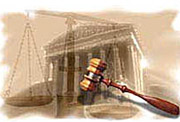| The Supreme Court reacted skeptically Tuesday to arguments that banks, lawyers, accountants and suppliers should be held liable for helping publicly held companies deceive investors. Chief Justice John Roberts and Justice Antonin Scalia suggested that federal law imposes strict limits on shareholders who want to sue companies and firms other than the one in which the investors hold stock. The two conservative justices subjected a lawyer for corporate investors to tough questioning during arguments as the justices try to set boundaries in stockholder lawsuits for securities fraud. Investors in Charter Communications Inc., one of the country's largest cable TV companies, are suing two suppliers that allegedly schemed with Charter executives to mislead stockholders about the company's revenue growth. The outcome of the case will determine the fate of a separate suit by Enron shareholders who are seeking over $30 billion from banks accused of colluding with the energy company to hide its debts. If the court rules against investors, "it will mean the end of the case" for Enron shareholders and the banks that were primarily liable, attorney Patrick Coughlin, representing Enron stockholders, said outside the Supreme Court after the arguments. In the case before the court, suppliers Scientific-Atlanta Inc. and Motorola Inc. "were not passive bystanders facilitating a fraud by Charter," said investor attorney Stanley Grossman. "Their deceptive conduct was integral to the scheme to create fictitious advertising revenues for Charter to report to investors." Why shouldn't the court be guided by its 1994 ruling that sharply restricted liability by saying investors cannot sue for aiding and abetting a securities fraud? the chief justice asked. "You're asking us to extend that liability." Outside the courthouse later, Grossman said, "We are not asking for an expansion. The other side is asking for a cutback." Earlier this year, Roberts and Justice Stephen Breyer did not participate when the court decided to hear the case. On Tuesday, Roberts was back, but Breyer was still out. As of last year, both owned stock in Cisco Systems Inc., which now owns Scientific-Atlanta. Though the absence of Breyer means the case could end up deadlocked 4-4, the hour of arguments Tuesday seemed to weigh against investors. Scalia suggested that the court might "sensibly limit" the right to sue so that schemes can be attacked by the Securities and Exchange Commission, but not by investors' lawsuits. That is how aiding and abetting violations are handled. "What distinguishes the liability that you propose from aider and abettor liability?" asked Scalia. Stephen Shapiro, the attorney representing Scientific-Atlanta and Motorola, said the lawsuit cannot proceed against the two suppliers unless they made misstatements to Charter's investors, prompting an objection from Justice Ruth Bader Ginsburg. Under the theory of Scientific-Atlanta and Motorola, "they are home free because they didn't themselves make any statement," said Ginsburg. "But they set up Charter to make those statements, to swell its revenues — revenues that it in fact didn't have." Charter persuaded the two suppliers to buy advertising that was bankrolled with money from Charter, which paid a $20 premium on each of hundreds of thousands of cable TV set-top boxes, for a total of $17 million. The amount of the overpayments equaled the amount the two suppliers paid for the advertising. Charter reported the advertising payments as revenue, a step that helped Charter paint a rosy financial picture for the fourth quarter of 2000, a move designed to artificially inflate the price of the stock. |





